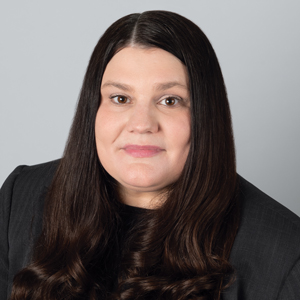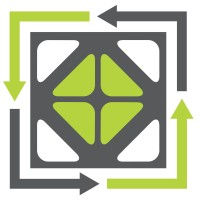Principal mentor guides South African businesswoman in Global Women’s Mentoring Partnership

Nicole Grundmeier May 25, 2023 | 3:01 pm
6 min read time
1,384 wordsAll Latest News, Insurance, Retail and Business, Women’s and Gender IssuesLinda Nyembezi named her business, Insele Capital Partners, after a voracious omnivore with a unique adaptation.
“Insele” means “honey badger” in isiZulu, Nyembezi’s native language.

“A honey badger is a tenacious and determined little animal, quite ferocious, small. But the honey badger also has a symbiotic relationship with the honeyguide bird. A honeyguide bird helps the honey badger to track the beehive, and the honey badger cracks it open. So the honeybird feeds on the honey and the honey badger on the insects. So it’s a good, mutually beneficial relationship. And that’s how I like to see my relationship with my clients,” Nyembezi said.
Nyembezi, whose dedicated fixed-income brokerage business is based in Johannesburg, South Africa, spent 10 days in Des Moines in May as part of another mutually beneficial relationship – a mentorship with Amy Friedrich, president of U.S. insurance solutions at Principal Financial Group.
Nyembezi and Friedrich were paired in the 2023 Fortune-U.S. Department of State Global Women’s Mentoring Partnership, which is overseen by the nonprofit Vital Voices Global Partnership. The program, in its 18th year, pairs “leading American women executives from within the Fortune Most Powerful Women’s network with emerging women in business from Egypt, Guatemala, Haiti, India, Kenya, Laos, Poland, Serbia, South Africa, Turkey and Zambia,” according to the State Department.
Nyembezi spent time in Friedrich’s home and tried some Des Moines restaurants. One of her favorites was Proudfoot & Bird, where she had “the most delicious octopus.”
“For a landlocked city, I was pleasantly surprised,” Nyembezi said.
The Business Record interviewed Nyembezi and Friedrich separately about their experience. This Q&A has been condensed and lightly edited for length and clarity.
What is your mentor-mentee relationship with Amy Friedrich like?
Nyembezi: There’s strong communication between the two of us, and I think that the ability to communicate with the mentor, you get the most out of it. It’s been very open. We’ve managed, in a very short space of time, to establish a level of trust, honesty between the two of us, so we are able to talk about just about anything and everything. And it’s also gone beyond just mentoring in the workspace. I’ve had the opportunity to see Amy operate in her own home with her kids, her husband, her family, as well as with her parents. So I’ve seen different aspects of Amy: Amy the powerhouse business leader, I’ve seen Amy the mom, I’ve seen Amy the wife, I’ve seen Amy the daughter, which is quite a privileged position to see your mentor in.
What is the most valuable lesson or advice that Amy has given you that you will take back to South Africa?
Nyembezi: She’s very intuitive, so she’s been able to pick up a lot of things about me that I had not overtly said, so I found that was quite interesting. And it made me then able to open up to her a lot more. She’s so dynamic. She’s a good strategist. It comes across in all that she says, a great communicator. So she’s actively engaged with all that she does, be it with her peers in the business, people reporting to her. So for me watching that, being fully present in what you do is quite important.
And also, she’s not running her own business but she’s a head of a big business unit within Principal, so the leadership skills and business skills that she has been able to impart on me, I will definitely be able to take away. She’s just given me food for thought on a lot of things from someone who has a global lens, a broader lens, teaching me to think wider and broader in terms of my own business, not just focusing on what I’m currently doing now, but having a growth mindset to do my business.
Any advice that you would give to a woman entering that mentor-mentee relationship?
Nyembezi: Go into it with an open mind. Be open to share your experiences, good or bad. You’re there to learn. So be open to criticism, because that’s also learning. Be able to share of yourself; no one knows you more than you know yourself, so put yourself out there. The comfort zone is only as comfortable as how far are you willing to grow? So it’s quite important to step out of your comfort zone. And a lot of growth happens out of your comfort zone. And I think it’s quite good to articulate your needs very clearly. Because that’s where the most outcomes come from; your mentor is clear about what you need, and they can work with you towards achieving those goals. Be open, actively engage your mentor and foster a relationship of trust and mutual respect; I think that goes a long way. Plan to build long-lasting relationships, lean on your mentor, be respectful of their time, because a lot of mentors are quite busy. The appreciation of someone’s time is very important. So use it wisely. Be a sponge, soak everything up. And not to be afraid to be vulnerable, because this is a space where you get the most out of.
What unique gifts or talents does Linda Nyembezi possess?
Friedrich: I would call her quietly fierce. She is very aware of the times where she could have entered into a situation and only felt different. Financial services in general, it can be a different experience when you’re young and female. We talked about feeling those past experiences, where you knew you really could lean into just feeling sort of different all the time. She had the additional dimension of being young, Black, female, and being from a Black minority setting for a lot of the companies that she first worked with.
We really ended up talking to each other a lot about what it meant to lean into what we were going to learn, how we’re going to learn it, and how we’re going to build ourselves and grow even in places where we felt a little bit different headed into the door. So I see her as fiercely intelligent, fiercely looking for creating something that’s going to have both meaning for her and make her feel like a success in the field that she chooses. She’s fantastically interesting. She speaks six languages. She would never bring that up. She is deeply affiliated with her family and her culture, but she knows more about things going on in the U.S., you know, in a global stage. I would say honestly, as I’m coming out of this, my knowledge of South Africa is exponentially better and my knowledge culturally of where, for example, a cultural affiliation to a Zulu ancestry is very meaningful. I had put very little thought, very little research, very little understanding about what having an ancestral relationship to Shaka Zulu [the founder of South Africa’s Zulu empire who lived from approximately 1787 to 1828] would mean to someone who lives in modern-day South Africa. So I selfishly found that fantastic. It was feeding every sort of nerd history part of me that was there.
What general advice would you have for anyone entering into a mentor-mentee relationship?
Friedrich: Number one, I would say assume you’re both going to learn a lot. I don’t like mentor-mentee relationships that assume there’s sort of a one-way transaction happening and that you have to sort of permissively open the door backwards to a two-way transaction. That’s not how it works at all. So my assumption is going to be, I’m as honest and authentic about the pieces where I am not as informed about something, and then I make the effort to actually ask. I make an assumption that both parties have things they want to learn from each other, that they have hopes and expectations, and they make that really clear to one another. I also assume that no one is putting on a show, meaning you’re not just showing them the good pieces, you’re showing them the tired pieces, you’re showing them the frustrated pieces, you’re showing them the authentic pieces of yourself, because I think that really begins to speak to what kind of culture you value.










